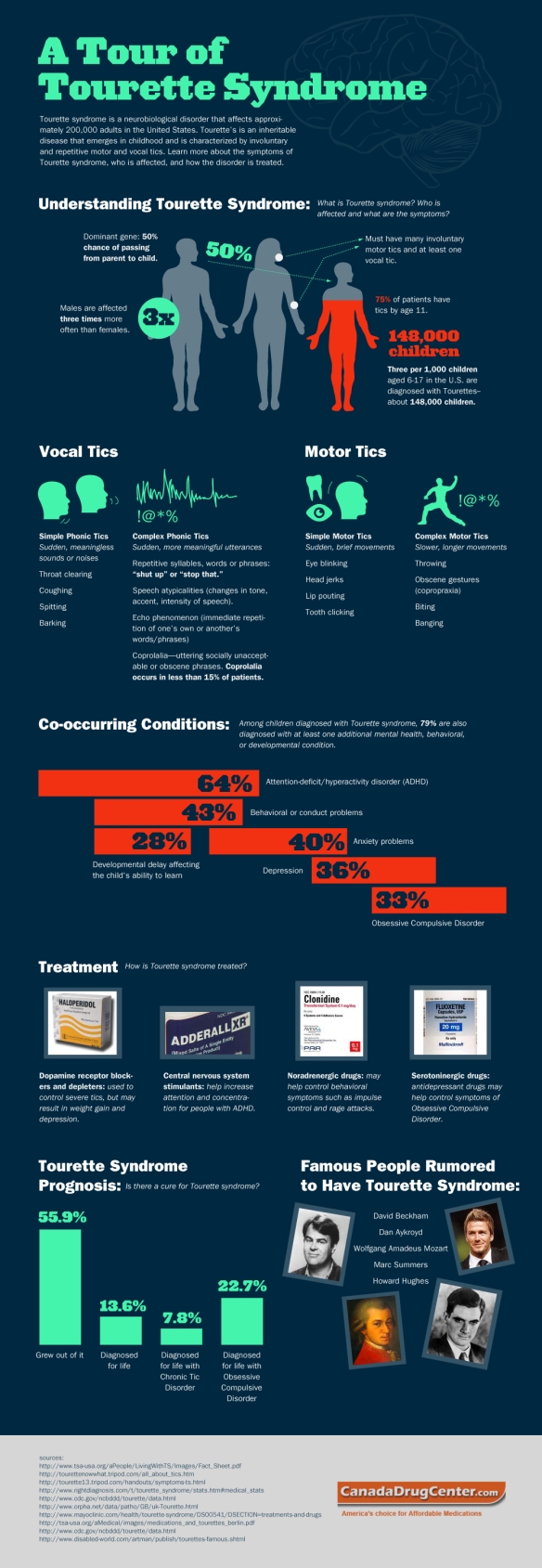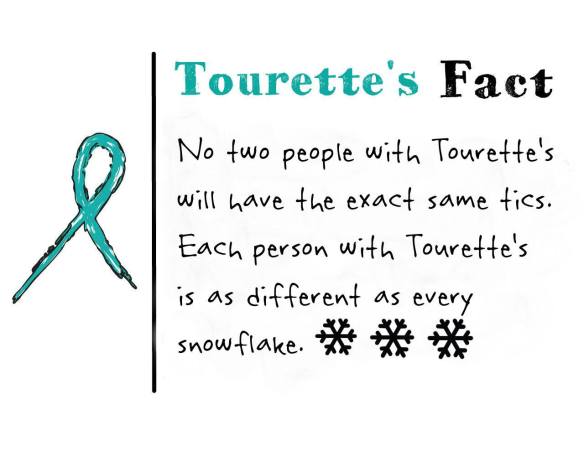EDUCATIONAL CONSEQUENCES OF TOURETTE’S SYNDROME
Does the presence of tics or Tourette’s Syndrome impact educational functioning? All available research and clinical experience suggest that it does, but the assessment of its impact has been somewhat muddied by the presence of comorbid conditions.
Pappert, Goetz, et al. (2003) found that 52% of children seen in their clinic experienced social or educational dysfunction. Of these, 39% required special education placement, 10% had been retained at least 1 year in school, and 29% experienced disciplinary problems. Their findings are consistent with other published reports from tertiary clinics, but it is their follow-up data on these children as adults that is of special interest and concern here. Whereas half the sample experienced significant social and education dysfunction as children, (only) 32% of the same sample experienced social or education dysfunction as adults. On a positive note, all of the sample participants had completed high school and at least two years of college (adult sampling was conducted while the individuals were in their 20’s). The investigators found that 71% of the adults were currently employed or pursuing their education. Of the adults who had social or educational dysfunction as children, 50% had social or education dysfunction as adults, and 13% of children who had not experienced education or social dysfunction went on to develop social or education dysfunction. Out of their sample of 31, then, while the majority were doing well and were well-integrated in their communities, over one quarter of the adults were disabled with problems that included alcohol abuse, unemployment or criminal activity. That these measures did not correlate with tic severity measures but did correlate with early childhood dysfunction suggests that early and effective interventions for comorbid conditions (perhaps even more so than for tics) may impact on the prevention of dysfunction in adulthood.
When reading reports on the educational impact of TS, be careful to consider whether the sample consists of youth with TS-only or TS+. If your child only has tics without any other comorbid symptoms or conditions, they may do quite well in a regular classroom as long as appropriate accommodations are made for interference they may experience from their tics. Also consider whether your child suffers from fine motor control impairment or impaired visual-motor integration, as those two functions have a significant impact on academic functioning. The school’s occupational therapist and psychologist can screen for impairment in those domains.
Resources-
Tics and Tourette’s Syndrome: Overview
Tourette Syndrome: A Guide for Parents
Tourette Syndrome: A Guide for Parents- NASP
Educating Children With TOURETTE SYNDROME:
Some Tips for High School Students
TIC DISORDERS AND TOURETTE SYNDROME SCHOOL CARE PLAN
Tic Sensitivity and Awareness Exercise
Famous People with Tourette’s Syndrome or Obsessive-Compulsive Disorder
Tourette’s Syndrome Plus the Associated Disorders
PowerPoint- tourette
Spanish Resources-
Consejos para manejar los tic en el aula (pdf)
Translation of material written by Leslie E. Packer, PhD
Educar a compañeros de niños y jovenes con Sindrome de Tourette (pdf)
Translation of material written by Leslie E. Packer, PhD
Consejos para integrar a alumnos con Trastorno Obsesivo Compulsivo (pdf)
Translation of material written by Leslie E. Packer, PhD
I Have Tourette’s but Tourette’s Doesn’t Have Me- Lesson Plan

Books for Educators:
- Cohen B: Front of the Class: How Tourette Syndrome made me the teacher I never had. Vanderwyk & Burnham, 2005. This was also made into a Hallmark special and is also available on DVD.
- Connors, S: The Tourette Syndrome & OCD Checklist: A Practical Reference for Parents and Teachers. Jossey-Bass, 2011.
- Dornbush MP, Pruitt SK: Teaching the tiger: A handbook for individuals involved in the education of students with attention deficit disorders, Tourette Syndrome or Obsessive-Compulsive Disorder. Hope Press, 1995.
- Dornbush MP, Pruitt SK: Tigers, Too: Executive Functions/Speed of Processing/Memory: Impact on Academic, Behavioral, and Social Functioning of Students With ADHD, Tourette Syndrome, and OCD Modifications And Interventions. Parkaire Press, 2009.
- Ottinger, Becky: Tictionary: A Reference Guide to the World of Tourette Syndrome, Asperger’s Syndrome, Attention Deficit Hyperactivity Disorder, and Obsessive-Compulsive Disorder for Parents and Professionals, Autism-Asperger’s Publishing Company, 2003 .
- Packer LE: Find a Way or Make a Way – Checklists of Helpful Accommodations for Students with ADHD, Executive Dysfunctions, Mood Disorders, Tourette’s Syndrome, OCD and Other Neurological Challenges. Parkaire Press, 2009.
- Packer LE, Pruitt SK: Challenging Kids, Challenged Teachers: Teaching Students with Tourette’s, Bipolar Disorder, Executive Dysfunction, OCD, ADHD, and More, Woodbine House, 2010. The print version is now out of print, but is available on Kindle at Amazon.com
- Tourette Syndrome Foundation of Canada: Understanding Tourette Syndrome: A Handbook for Educators. Ordering information is available on their web site.
Organizations:
Tourette Syndrome Association, Inc.
42-40 Bell Blvd., Suite 205
Bayside, NY 11361–2861
Telephone: (718) 224-2999
Fax: (718) 279-9596
Web: http://tsa-usa.org
Tourette Syndrome Foundation of Canada
5945 Airport Rd – Suite #195
Mississauga, Ontario
Canada L4V 1R9
Telephone: 1-800-361-3120 or (905) 673-2255
Fax: (905) 673-2638 or 1 (800) 387-0120
Web: www.tourette.ca


